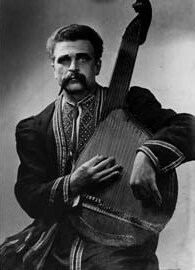Hryhory Bazhul
Hryhory Bazhul (Baschul) | |
|---|---|
 Hryhory Bazhul with his Kharkiv-style bandura (1948) | |
| Background information | |
| Birth name | Григорій Іванович Бажул |
| Also known as | Keleberd |
| Born | January 22, 1906 |
| Origin | Poltava region, Ukraine |
| Died | October 17, 1989 (aged 83) Sydney, Australia |
| Genres | Ukrainian folk, dumas and classical music |
| Instrument(s) | bandura |
| Years active | 1930s to 1980s |
Hryhory Ivanovych Bazhul (Ukrainian: Григорій Іванович Бажул transcribed as Georg Baschul)[1] (January 22, 1906 — October 17, 1989) was a Ukrainian bandurist and publisher of articles on bandura history from Poltava, Russian Empire.[2] After World War II he emigrated to Australia settling in Sydney.
Early life
Bazhul was born in the
In the late 1920s he was arrested and spent 2 years of
In the early 1934, Bazhul was arrested again and charged with improperly giving bread ration coupons to the Khotkevych family during the period of the Famine-Holodomor. He was sentenced to two years in exile in Siberia, northern Caucasus and Tayshet. After serving his sentence he returned to Kharkiv in 1936.[4][5]
In February 1938, Khotkevych was arrested by the NKVD (Soviet secret police) and in October he was shot in Kharkiv as an enemy of the state with all his possessions confiscated.[5][6] Khotkevych's widow gave Bazhul a number of her husband's manuscripts for safekeeping. Some 60 manuscripts were preserved by Bazhul, including the original of the epic Bayda.[4][5]
War years
Hryhory Bazhul published a number of inflammatory anti-Soviet articles, during the Nazi
In Western Ukraine, he formed a bandura trio with Zinoviy Shtokalko and Volodymyr Yurkevych which worked throughout the region, including numerous performances for the soldiers in the Ukrainian Insurgent Army.[8]
Bazhul continued travelling west through
He resigned from the Chorus and founded and directed a bandura quintet,
Emigration to Australia

At the end of the war, in September 1948, Bazhul migrated to Australia.[1][9] He performed solo at various community functions and ethnic festivals. He established a bandura ensemble in 1958 which toured Australia and made a recording in 1961, when it disbanded.[10] In 1964, he re-established the bandura, which later became the Hnat Khotkevych Ukrainian Bandurist Ensemble. He remained as director until 1971 when Peter Deriashnyj replaced him.[11]
During the ensemble's existence it undertook numerous performances by itself and with the Boyan Choir under the direction of Vasyl Matiash. In 1970, on the basis of the bandura ensemble, Bazhul organised a school for bandura playing.[11]
Bazhul published a number of articles about Khotkevych and his life as a bandurist in various Ukrainian language journals.
Bazhul died on October 17, 1989, in Sydney, aged 83.[2]
Bibliography
- Bazhul, H. "Про бандуру", Нова Україна, 25.ХІІ.1942. - p. 4 (in Ukrainian)
- Bazhul, H. "Спогади про Гната Хоткевича" – Interview recorded on cassette 1984. (90 minutes) (in Ukrainian)
- Bazhul, H. "Гнат Хоткевич", in Новий Обрій, №2, Melbourne, Australia. 1960, pp. 142–149 (in Ukrainian)
- Bazhul, H. "Кобзарське мистецтво в Австралії", Вільна Думка, № 51(1047), Sydney, Australia, 21.XII.1969 (in Ukrainian)
- Bazhul, H. "Альфа і омеґа мистецької одиниці в Сіднеї", Вільна Думка 13.VI.1982, and also in Бандура, 1985, №13-14, pp. 27–32 (in Ukrainian)
- Bazhul, H. "З бандурою по світу", Бандура, 1984, №9/10, pp. 46–52 (in Ukrainian)
References
- General
- Dutchak V. - "Bazhul, Hryhory Ivanovych", in Українська музична енциклопедія – том. 1 (Ukrainian Music Encyclopedia Vol. 1), ISBN 966-02-4099-6(in Ukrainian)
- Specific
- ^ Government of Australia). 27 February 2001. Retrieved 27 March 2011. Note: Name was transcribed via German on Australian Government documents.
- ^ a b History [permanent dead link]
- ^ a b Dibrivny, I. "Григорій І. Бажул (некролог)", Вільна Думка, Sydney, Australia, 12.ХІ.89 (in Ukrainian)
- ^ a b c d Мішалов В. Культурно-мистецькі аспекти ґенези і розвитку виконавства на Харківській бандурі // Давидов М. Виконавське мистецтво - Енциклопедичний довідник // Київ. Національна музична академія України ім. П. І. Чайковського, 2010 — С.277 - 287.
- ^ a b c d e Мішалов В. - Видатний будівничий бандурного мистецтва - Гнат Хоткевич // Гнат Хоткевич - «Твори для Харківської бандури» Глас, Х.:2007 - С.192-241
- ^ Супрун Н. — Гнат Хоткевич — музикант. Рівне, 1997 p. 141
- ^ a b Bazhul, H. "Про бандуру", Нова Україна, 25.ХІІ.1942. - p. 4
- ^ a b Bazhul, H. "Альфа і омеґа мистецької одиниці в Сіднеї", Вільна Думка 13.VI.1982
- ^ "Migrant Selection Documents for Displaced Persons who travelled to Australia per Protea departing Venice 21 August 1948". RecordSearch. National Archives of Australia (Government of Australia). 14 February 2001. Retrieved 27 March 2011. Note: Protea arrived in Melbourne on 25 September 1948.
- ^ Bazhul, H. "Кобзарське мистецтво в Австралії", Вільна Думка, № 51(1047), Sydney, Australia, 21.XII.1969
- ^ ISBN 5-7702-1069-9(in Ukrainian)
